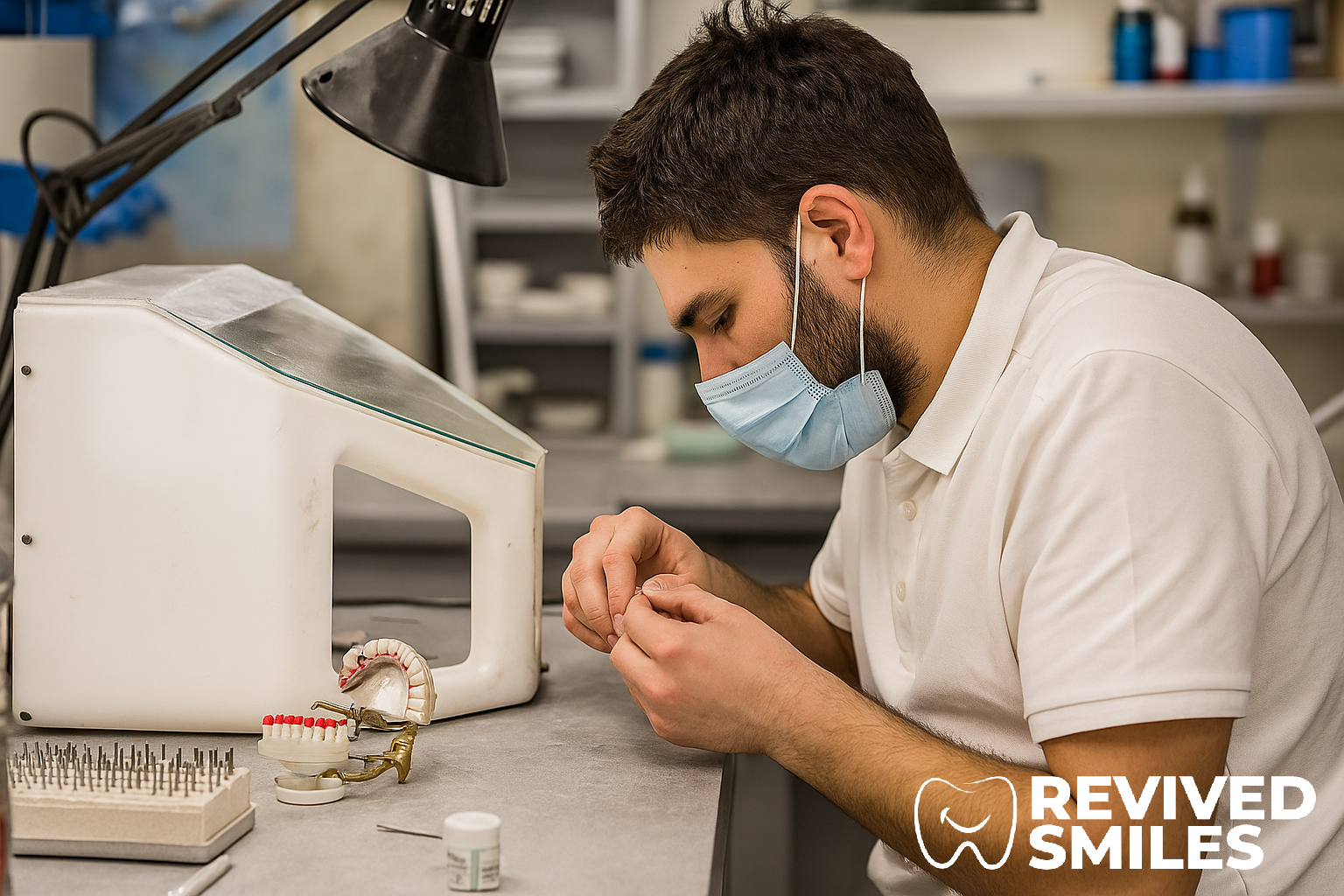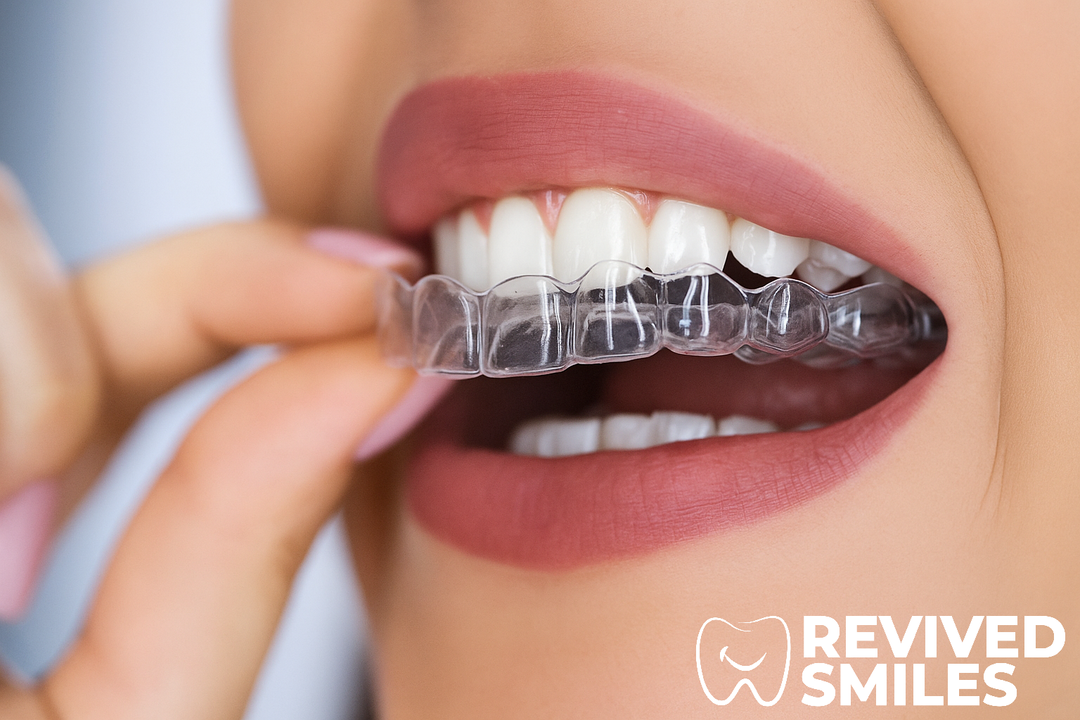How the Full Denture Process Works: A Step-by-Step Guide to Getting Your Smile Back

Losing all the teeth in your mouth can feel overwhelming. It changes how you eat, how you speak, and how confident you feel when you smile. Fortunately, dentures offer a way to restore function and appearance in a way that’s accessible, affordable, and life-changing.
Dentures can be a solution for people missing one or more teeth, not just those missing all their teeth.
If you’re wondering how the full denture process works, you’re not alone. Getting dentures is a journey made up of several stages, and understanding each one can make the experience far less intimidating.
Whether you’re considering full or partial dentures or exploring other denture options like implant supported dentures or snap in dentures, we’re walking with you every step of the way.
What Are Full Dentures and Who Needs Them?
Full dentures, also called complete dentures, are custom-made removable replacements for all the teeth in your upper or lower jaw. They’re typically recommended when all the teeth have been lost or need to be removed due to damage, decay, or other dental issues. Full dentures are a common and effective method for replacing missing teeth.
They’re different from partial dentures, which are used when some natural teeth remain. Both types can restore your ability to chew, speak clearly, and smile with confidence. They also support your facial muscles and help prevent the sagging that occurs when teeth are missing.
If you’re looking to replace missing teeth, full dentures may be your best option. They’re ideal when there are no healthy teeth left or when teeth need to be extracted for better oral health.
It’s important to note that sufficient bone support is necessary for denture stability, and bone loss may affect your eligibility for dentures or the type of denture recommended.
The Full Denture Process Step-by-Step
The complete dentures process involves several key stages to ensure your dentures fit comfortably and enhance your quality of life. Let’s walk through the journey.
1. Initial Consultation and Assessment
Your journey begins with an initial consultation. During this visit, dentists play a key role in providing trusted recommendations and creating personalized treatment plans. Your dentist reviews your medical history, examines your mouth, and may take X-rays or scans. This helps them understand your unique situation and tailor the treatment to your needs.
Whether you have existing teeth or not, this is where your dentist determines what kind of dentures, full, partial, traditional, or implant retained dentures, are right for you.
A preliminary impression may also be taken during the initial assessment to help plan for accurate and natural-looking dentures.
2. Tooth Extraction (If Necessary)
If you have remaining teeth that can’t be saved, the next step is teeth extraction. This procedure may be done all at once or over multiple visits, depending on your needs. After the teeth are extracted, the healing process begins.
For many patients, immediate dentures are provided right after teeth are removed. These temporary removable dentures help you maintain appearance and basic function while your gum tissue heals.
3. Healing and Temporary Dentures
The healing phase typically lasts between six to eight weeks, but it varies depending on your health and how your gums respond. Your gum tissue will shrink and change shape, which can cause new dentures to feel loose over time.
This is normal and expected. Wearing dentures during this period helps you adapt gradually, but it’s also when sore spots or pressure points may develop. Your dentist will schedule follow-up visits to make adjustments as needed.
4. Preliminary Impressions and Bite Registration
Once your gums have healed, your dentist or dental lab team will take preliminary impressions of your upper and lower jaws. Precise impressions are essential to ensure that the denture fits comfortably and securely. This is a crucial part of the denture process.
Your bite registration is also recorded to capture how your jaws align. Getting this step right helps ensure your final dentures feel natural and function well during speaking and chewing.
5. Try-In and Final Fitting
Next comes a wax try-in, which lets you preview what your new smile will look like. The artificial teeth are set in wax so you and your dentist can evaluate fit, comfort, aesthetics, and bite alignment.
If needed, final adjustments are made before your permanent dentures are crafted by skilled dental technicians. This ensures your dentures fit perfectly and provide optimal denture stability.
6. Delivery of Final Dentures
When your final denture is ready, it’s time for delivery. At this stage, you receive the completed, polished final denture, marking the culmination of your treatment process. Your dentist will check how it feels and make small refinements if needed.
Whether you’re getting full dentures for the first time or replacing an older set, this is a major step toward improving your dental health and restoring your confidence.
7. Follow-Up Appointments and Adjustments
Even perfectly crafted dentures need a little supplemental support after placement. It’s common to experience mild discomfort or develop sore spots as your mouth adjusts to your new dentures.
That’s why follow-up visits are essential. Your dentist can fine-tune your dentures and relieve any excess pressure, helping you feel more comfortable and confident. A fitting appointment is typically scheduled after denture fabrication to make necessary adjustments and ensure the dentures fit correctly.
How Long Does the Full Denture Process Take?

The full denture timeline varies from person to person, but here’s a general breakdown:
-
Initial consultation: 1 visit
-
Tooth extractions (if needed): 1 or more visits
-
Healing period: 6 to 8 weeks
-
Impressions and bite registration: 1 to 2 weeks
-
Try-in and fitting: 1 to 2 weeks
-
Final delivery: 1 visit
-
Follow-up visits: As needed for adjustments
Altogether, getting dentures usually takes about 2 to 3 months from the first appointment to the final fitting.
Challenges and Solutions When Getting Dentures
The journey to wearing dentures comfortably isn’t without hurdles, especially for first-time denture wearers. Many people wear dentures to restore function and aesthetics after tooth loss, regardless of age. Regular dental visits can help maintain or improve denture cosmetics, ensuring dentures look and feel their best. Here are some common concerns:
Fit and Comfort
It’s not unusual for new dentures to feel odd at first. They may move slightly or feel bulky. That’s why proper care, regular dental visits, and adjustments are so important.
Eating and Speaking
Soft foods are your best friend during the early stages. Practice reading aloud and chewing slowly to get used to your new dentures. Over time, it becomes second nature.
Adhesives and Security
Using a denture adhesive can help your dentures fit more securely. This is especially helpful if your lower jaw has less gum support or you’re wearing traditional dentures without implants.
Tips for First-Time Denture Wearers
Getting used to removable dentures takes time, but there are plenty of ways to make the transition easier:
-
Start with soft foods and gradually introduce firmer textures.
-
Clean your dentures daily with products designed for denture care.
-
Soak them overnight to keep them from drying out.
-
Never try to adjust them yourself, leave that to your dentist.
-
Be patient. Your facial muscles and oral tissue need time to adapt.
Exploring Denture Options: Which Is Right for You?
When deciding between full or partial dentures, it’s important to evaluate your current dental condition. If you still have healthy teeth, partial dentures may be the best choice. If all your teeth are missing or need to be extracted, complete dentures or implant supported dentures might be more appropriate.
For those seeking more stability, implant retained dentures or snap-in dentures provide a secure fit with the help of dental implants. These options help dentures fit more like natural teeth and reduce movement.
Talk to your dentist about which options work best for your needs, budget, and lifestyle.
Caring for Your Dentures
Just like natural teeth, dentures need proper care. Cleaning them daily helps remove bacteria, maintain appearance, and extend their life.
Here are some care tips:
-
Rinse after eating
-
Brush with a denture-friendly cleanser
-
Soak overnight
-
Store in water when not in use
-
Visit your dentist regularly for checks and cleanings
With the right care and attention, dentures continue to support your oral health and quality of life for years.
FAQs
Q: How long does the full denture process take from start to finish?
A: On average, it takes 2 to 3 months, including healing time and several office visits.
Q: What are the steps involved in getting full dentures?
A: The denture process includes an initial consultation, extractions if needed, healing with immediate dentures, impressions, bite registration, try-in, final dentures, and follow-ups.
Q: Can full dentures be adjusted if they don’t fit well?
A: Yes, traditional dentures can be adjusted or relined to improve fit and reduce sore spots.
Q: Is it painful to get full dentures?
A: Some discomfort is normal, especially after teeth are removed or when wearing new dentures. Most issues are temporary and manageable.
Q: How many appointments are needed to complete the full denture process?
A: Most patients need about 4 to 6 appointments, including the initial consultation, fitting, and final adjustments.
Final Thoughts
The full denture process isn’t just about getting artificial teeth. It’s about restoring confidence, eliminating uncomfortable or embarrassing gaps, and reclaiming your ability to eat and speak freely.
Whether you’re exploring permanent dentures, traditional dentures, or removable replacements, working with an experienced dental team ensures your dentures fit comfortably and look great.
At Revived Smiles, we specialize in helping people just like you craft dentures that look natural and feel secure. If you're ready to begin your journey toward a better smile, schedule your consultation with us today.





Leave a comment